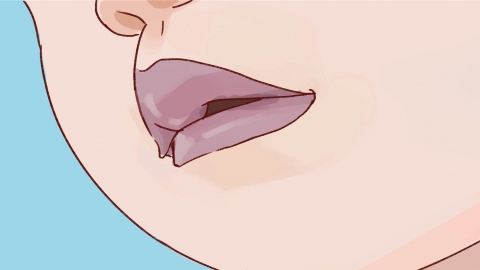What causes purple lips?
Generally, purple lips may be caused by physiological pigmentation, food or drug staining, indigestion, chronic obstructive pulmonary disease (COPD), methemoglobinemia, and other reasons. If discomfort occurs, timely medical consultation is recommended. Detailed explanations are as follows:

1. Physiological Pigmentation
Some individuals may have increased pigmentation on their lips due to congenital factors, which can cause the lips to appear purplish. However, there are usually no other physical discomforts. This condition typically does not require special treatment and is considered normal; therefore, excessive concern is unnecessary.
2. Food or Drug Staining
Consumption of deeply colored foods or use of certain medications may stain the lips, causing them to appear dark purple. However, this condition can usually be improved through cleansing. After consuming dark-colored foods or using potentially staining medications, promptly rinse the lips with warm water to prevent prolonged pigment adherence.
3. Indigestion
Factors such as irregular eating habits, overeating, and high mental stress may lead to gastrointestinal dysfunction. Poor digestion and absorption can hinder nutrient uptake, potentially causing lips to appear purplish due to malnutrition. This may also be accompanied by symptoms such as bloating and abdominal pain. Treatment may include medications such as Weixiaoshi tablets (gastric aid), Hawthorn Pills, and Zhishi Da Zhi Wan, under a doctor's guidance.
4. Chronic Obstructive Pulmonary Disease
Chronic obstructive pulmonary disease may result from long-term smoking, inhalation of harmful gases or particles, respiratory infections, and other factors that impair lung ventilation and gas exchange functions. These pulmonary disorders can reduce oxygen levels in the blood, causing lips to appear cyanotic due to hypoxia. Symptoms such as coughing and sputum production may also be present. Patients may use medications such as terbutaline sulfate tablets, acetylcysteine granules, and ipratropium bromide aerosol under medical supervision.
5. Methemoglobinemia
Methemoglobinemia may be caused by congenital enzyme deficiencies, hereditary factors, exposure to certain drugs or chemicals, and dietary habits. Methemoglobin cannot effectively carry oxygen, potentially leading to tissue hypoxia and purplish lips due to oxygen deficiency. Symptoms such as dizziness and fatigue may also occur. Patients may use medications such as methylene blue injection, vitamin C tablets, and coenzyme Q10 capsules as advised by a physician.
In daily life, maintaining healthy habits, regular health checkups, and timely detection and management of underlying health issues are recommended. Avoid prolonged exposure to cold environments and ensure adequate warmth. Smoking cessation and alcohol moderation can also help reduce damage from harmful substances.










